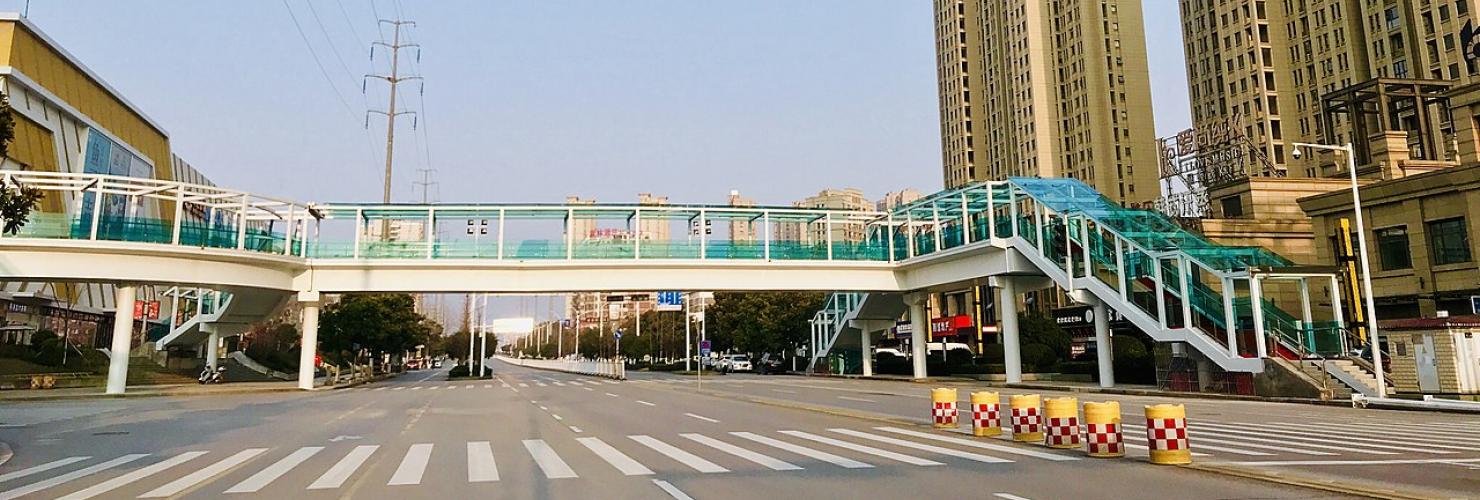

Coronavirus outbreak: China sympathizers are making everything worse
There is a tendency in politics and the media to tone down criticism of Beijing. But this is damaging to all those in China who bravely oppose the regime's dictatorship, says Kristin Shi-Kupfer.
The coronavirus is not the only problem the world has right now. Increasingly people are also talking about who is responsible for this crisis – and the finger of blame is pointing toward the Chinese government. You might want to ignore Donald Trump ranting about the “China virus”, but discontent is growing among European leaders – both about the initial cover-up in Wuhan, the Chinese epicentre of the epidemic, and about the defective "Made in China" medical equipment delivered to Europe. African countries have expressed their indignation at the discrimination against their citizens in China. In the United States as well as in Europe, politicians and NGOs are calling for legal action to be taken at an international level against the Chinese government.
The Chinese government is working with every means on its own narrative
As positions harden, Beijing is meeting accusations with counter accusations, for example, that Sars-CoV-2 originated in the United States or Italy. Chinese diplomats abroad are seeking out news that demonstrates the inefficiency and irresponsibility liberal democracies – with varying degrees of success. Using social media platforms that are blocked in the People's Republic, Chinese officials, self-proclaimed patriots and willing bots accuse critics from abroad of having hurt the feelings of the Chinese people. The Chinese embassy in Sri Lanka, for example, complained on its Twitter account, after it was temporarily blocked, that it had been denied freedom of expression (which does not exist in China itself). According to Beijing, the US company Twitter apparently applies double standards, only allowing others the freedom to stir up racism and hatred.
China’s criticism of the critics is finding a voice here too
At the same time, the Chinese leadership is looking for allies abroad to give it a good grade for its fight against the coronavirus. Politicians, business-people, scientists, doctors, journalists and also China experts from liberal democracies are adding their voices to the complaints from Beijing. They accuse their compatriots, who criticise the Chinese government, of arrogance and sometimes also racism. They mean well, they say. For by criticizing all those who criticize Beijing, they claim to be sending out a warning against moral arrogance on the part of the “West”, against double standards and hair-splitting. But they don't realize that their attitude provides support for racism and arrogance within China; they are protecting a Chinese leadership that discriminates against ethnic and social minorities and oppresses everyone and everything that could endanger its claim to absolute power.
Those who denounce all critics of the Chinese regime foster racism and arrogance in China: They fail to recognize that Beijing discriminates against ethnic and social minorities and cracks down on all those who would endanger their power monopoly. They fail to recognize the many brave Chinese who stand up against their government – like Li Wenliang, the doctor who was the first whistle blower in the corona crisis, the journalist Fang Fang, or the inhabitants of Wuhan who shouted “Fake, fake, everything fake” at a senior delegation from Beijing visiting their district to conduct a tour of victory over the virus. But also all those Chinese who have had to pay dearly for their commitment to freedom and justice, for example, with life imprisonment – like the Uyghur economist Ilham Tohti, or with torture – like the civil rights activist Liu Dejun who lives in Germany, or even with death – like the late Nobel Peace Prize winner Liu Xiaobo.
China sympathizers are prepared to accept that there are victims of the one-party state
These self-appointed defenders of the Chinese government obviously cannot or do not want to imagine that there are people outside China who criticize the Chinese regime and express solidarity with these Chinese citizens, even want to support them. They claim that Western observers lack both the ability and the authority to criticise the Chinese power apparatus. Often, they justify this with the “historical burden of Western civilization”, referring to the 19th and 20th century when China, too, was oppressed by the colonial powers. The historical guilt borne by "the West" prohibits it from making any criticism of its former victim, China.
Thus, those who advocate this line of argument appear able to accept, in silence, today’s victims of an all-powerful one-party state. These critics go even further, denying in general the existence of universal human rights or values. They argue that Western values should not be imposed on “the Chinese” in the way that missionaries once did. Following this logic, critical intellectuals and activists in China are either brainwashed Westerners or traitors to the fatherland. But these are precisely the arguments that the Chinese Communist Party uses to try to discredit and silence Chinese critics at home and abroad.
China is a dictatorship, the United States is a democracy
Those who complain of double standards demand that critics of the Chinese government in liberal states should, first and foremost, carry out self-criticism. If you point a finger at others, three fingers are pointed at you, as they say in China. Exactly. If you follow this argument, the same should also apply to all those Chinese officials who point their finger at critics at home and abroad. But angry Chinese ambassadors or appeasing Chinese business partners seem to be excluded from this logic. Moreover, those who apply double standards often say: “Beijing isn’t doing anything different from Washington”, or: “Look, Xi is more reliable than Trump”. The fact is that no matter how unreliable Donald Trump may be, he can neither cover up the traces of his government’s irresponsible actions nor silence open criticism, even from within his own ranks. Xi Jinping could do all this - at least by virtue of the Community Party statutes.
The fact that critical voices are still heard in China should give us grounds for hope. However, it should not encourage us to confuse a dictatorship with a functioning democracy. Those who accuse the critics of the Chinese leadership of splitting hairs emphasise how important pragmatic cooperation with China is, especially in these times. This, they argue, should not be put at risk – not least for their own interests but also in the name of stability. We cannot solve any global crisis without China, they claim. Some people also argue that to say that the Communist Party is evil but the Chinese people are good, is a simplification. They say this view ignores the fact that China's Communist Party members are themselves drawn from society and that the Party works within society. Moreover, most cadres – like politicians in other countries – are just trying to do the best for their people. And, of course, politicians make mistakes too.
Beijing’s critics at home deserve solidarity
What these positions fail to recognise is that it is not criticism of the Chinese regime that endangers worldwide solidarity and cooperation in the fight against the corona pandemic. Far more dangerous is the cowardice of not calling unpleasant facts by their real name. More and more Chinese citizens are, through their own passion for the truth, courageously forcing their own system to make compromises. Citizen journalists and reporters from Caixin magazine have ensured through their investigative reports that no part of the horrendous reality in Wuhan could be completely concealed. Most likely thanks to huge internal pressure, Beijing has corrected the death figures in Wuhan upwards – although the extent is still hardly credible. This shows that if we want to cooperate more effectively and successfully with China, these critical voices from within China require support. It is not the critics of the Chinese leadership who are to blame if political Beijing terminates all cooperation with liberal foreign countries. On the contrary, a collective silence on the part of the West towards an autocratic China would encourage the rulers in Beijing to continue to act above any criticism, as if nothing had happened.
